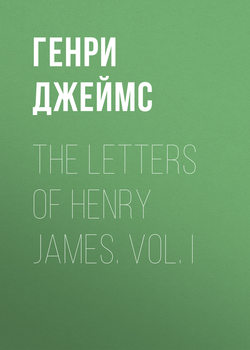Читать книгу The Letters of Henry James. Vol. I - Генри Джеймс, Henry Foss James - Страница 5
I
FIRST EUROPEAN YEARS (1869-74)
To his Mother
Оглавление7 Half Moon St., W.
March 26, 1869.
My dearest Mother,
This will have been my fifth weekly bundle since my arrival, and I can't promise—or rather I forbear to threaten—that it shall be as hugely copious as the others. But there's no telling where my pen may take me. You see I am still in what my old landlord never speaks of but as 'this great metropolis'; and I hope you will believe me when I add, moreover, that I am in the best of health and spirits. During the last week I have been knocking about in a quiet way and have deeply enjoyed my little adventures. The last few days in particular have been extremely pleasant. You have perhaps fancied that I have been rather stingy-minded towards this wondrous England, and that I was [not] taking things in quite the magnanimous intellectual manner that befits a youth of my birth and breeding. The truth is that the face of things here throws a sensitive American back on himself—back on his prejudices and national passions, and benumbs for a while the faculty of appreciation and the sense of justice. But with time, if he is worth a copper, the characteristic beauty of the land dawns upon him (just as certain vicious chilblains are now dawning upon my poor feet) and he feels that he would fain plant his restless feet into the rich old soil and absorb the burden of the misty air. If I were in anything like working order now, I should be very sorry to leave England. I should like to settle down for a year and expose my body to the English climate and my mind to English institutions. But a truce to this cheap discursive stuff. I date the moment from which my mind rose erect in impartial might to a little sail I took on the Thames the other day in one of the little penny steamers which shoot along its dirty bosom. It was a grey, raw English day, and the banks of the river, as far as I went, hideous. Nevertheless I enjoyed it. It was too cold to go up to Greenwich. (The weather, by the way, since my arrival has been horribly damp and bleak, and no more like spring than in a Boston January.) The next day I went with several of the Nortons to dine at Ruskin's, out of town. This too was extremely pleasant. Ruskin himself is a very simple matter. In face, in manner, in talk, in mind, he is weakness pure and simple. I use the word, not invidiously, but scientifically. He has the beauties of his defects; but to see him only confirms the impression given by his writing, that he has been scared back by the grim face of reality into the world of unreason and illusion, and that he wanders there without a compass and a guide—or any light save the fitful flashes of his beautiful genius. The dinner was very nice and easy, owing in a great manner to Ruskin's two charming young nieces who live with him—one a lovely young Irish girl with a rich virginal brogue—a creature of a truly delightful British maidenly simplicity—and the other a nice Scotch lass, who keeps house for him. But I confess, cold-blooded villain that I am, that what I most enjoyed was a portrait by Titian—an old doge, a work of transcendent beauty and elegance, such as to give one a new sense of the meaning of art.... But, dearest mammy, I must pull up. Pile in scraps of news. Osculate my sister most passionately. Likewise my aunt. Be assured of my sentiments and present them to my father and brother.
Thy HENRY jr.
